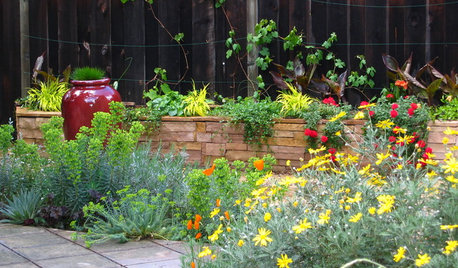Share your Battle against the swarm!
dhromeo
11 years ago
Related Stories

LIFEHard Winter? 9 Ways to Battle Cabin Fever
We know a lot of you are trapped where it just won’t stop snowing. Here are some ways to survive
Full Story
HOUZZ TOURSHouzz Tour: Battling the Tides Results in a Wondrous House on the Water
A complex construction effort pays off big-time with unobstructed views of Blue Hill Bay in Maine
Full Story
MOST POPULAR7 Ways to Rock a TV and Fireplace Combo
Win the battle of the dueling focal points with a thoughtful fireplace arrangement that puts attention right where you want it
Full Story
SUMMER GARDENINGHouzz Call: Please Show Us Your Summer Garden!
Share pictures of your home and yard this summer — we’d love to feature them in an upcoming story
Full Story
CONTEMPORARY HOMESHouzz Tour: Unusual Mixes of Old and New in Texas
Modern touches done in surprising ways give a traditional Austin house a whole new personality
Full Story
MOST POPULARThree Magic Words for a Clean Home and a Better Life
Not a natural tidying and organizing whiz? Take hope in one short phrase that can change your life forever
Full Story
DECLUTTERINGDecorate with Intention: Clutter Clearing 101
Fearlessly face disorganized areas to find the home of your dreams
Full Story
HOUZZ TOURSHouzz Tour: Just What Mom Wanted, Off the Washington Coast
With an art studio, age-in-place features and a view-maximizing design, this home shows just how well the architect knows his client
Full Story
ECLECTIC HOMESMy Houzz: Rooms With a View on Whidbey Island
A Washington writer turns a neglected rental cottage into a bohemian beauty
Full Story
HOMES AROUND THE WORLDMy Houzz: Author Makes Her Home in a Quiet Corner of Hertfordshire
British novelist Freya North refreshes a dated bungalow to create an idyllic country home for her family
Full Story





Puggylover Zone 9B Norco, CA
ltilton
Related Professionals
Baltimore Landscape Architects & Landscape Designers · Elgin Landscape Contractors · Medford Landscape Contractors · Dixon Landscape Contractors · East Chicago Landscape Contractors · Gurnee Landscape Contractors · Hollywood Landscape Contractors · Long Beach Landscape Contractors · Munster Landscape Contractors · Muttontown Landscape Contractors · North Highlands Landscape Contractors · Saint Paul Landscape Contractors · West Haverstraw Landscape Contractors · Selma Landscape Contractors · Raynham Driveway Installation & Maintenancesunnibel7 Md 7
dhromeoOriginal Author
soonergrandmom
noinwi
drippy
czech
rhizo_1 (North AL) zone 7
pnbrown
itzybitzy_gw
dhromeoOriginal Author
rhizo_1 (North AL) zone 7
bella_trix
ltilton
dhromeoOriginal Author
coralb
sunnibel7 Md 7
dhromeoOriginal Author
drippy
wayne_5 zone 6a Central Indiana
pnbrown
sunnibel7 Md 7
dhromeoOriginal Author
art_1
pnbrown
tomatoesandchickens
dhromeoOriginal Author
wayne_5 zone 6a Central Indiana
hind_sight
ltilton
nancyjane_gardener
franktank232
dhromeoOriginal Author
dhromeoOriginal Author
wayne_5 zone 6a Central Indiana
drscottr
williammorgan
elisa_z5
williammorgan
williammorgan
williammorgan
adc14